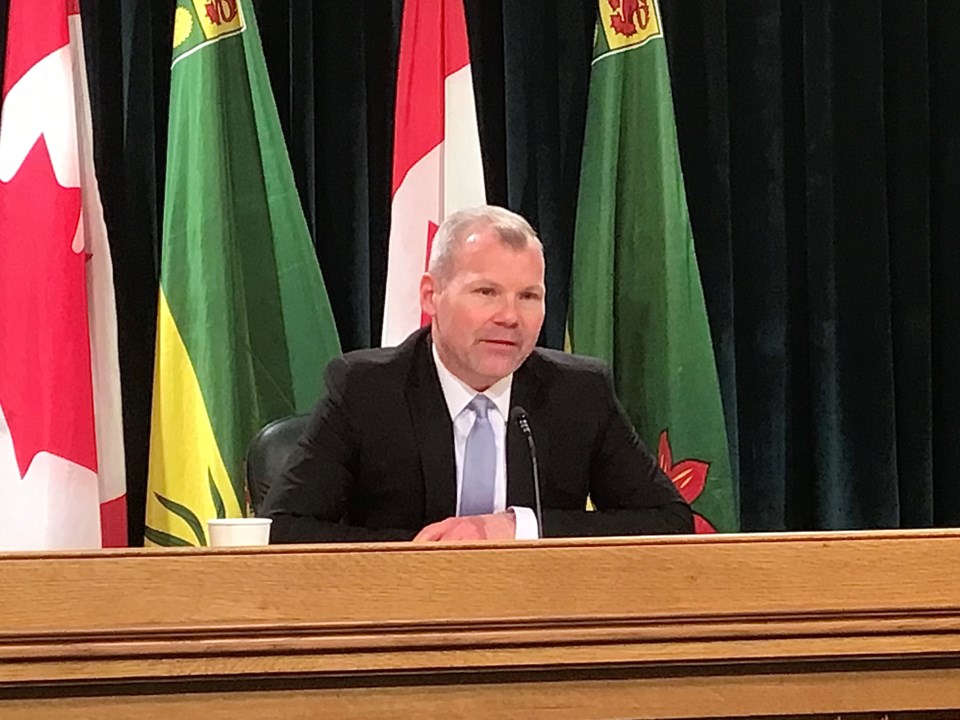REGINA - The Saskatchewan government has made it known once again that it is not on board with the federal government’s proposed Clean Electricity Regulations.
At a news conference at the Legislature Tuesday, Minister of Crown Investments Corporation Dustin Duncan outlined the province’s submission to the federal consultations taking place on the Clean Electricity Regulations. He said they were urging the federal government not to proceed with the CER.
“The federal government sets an unrealistic goal of net-zero national electricity grid by 2035. It undermines provincial decision making and ignores regional considerations. In Saskatchewan our provincial government and its utility Crown, SaskPower, have a plan to achieve the net-zero emissions from the province’s power sector by 2050. As we move forward and embark on this path, our government will not sacrifice affordability and system reliability. We need to meet the current and future energy requirements of our residents and communities, businesses and industries to continue to support a growing province.”
Duncan outlined his concerns in a letter penned to federal Minister of Environment Steven Guilbeault dated Dec. 2. That letter included three main points — that the CER was unaffordable, unconstitutional and unattainable.
Here are the key takeaways from Duncan’s news conference on Tuesday:
Unaffordable
In his response, Duncan noted that the costs associated with the CER unaffordable. His letter stated that the federal plan is expected to cost approximately $40 billion in Saskatchewan alone from now until 2035.
That number, Duncan told reporters, is based on the different technologies they would need to deploy within the timeframe established by 2035, as well as what the cost would be to proceed with those different technologies.
Duncan also pointed to what he described in the letter as “a grossly insufficient federal funding plan, which at present is not even adequate the cover what would be needed in Saskatchewan.” He said that SaskPower projects rates will need to more than double by 2035 — a 107 per cent increase — to cover the costs imposed by the CER and coal regulations. He said the magnitude of such a rate increase would price out residents from the electricity market altogether.
"The potential rate hikes, and response to federal regulations, will erode the viability of our industries, impact employment across all sectors, and disproportionately harm lower income households. Without adequate federal funding to support this major energy transition, these Clean Electricity Regulations are unaffordable for Saskatchewan."
Unconstitutional
Duncan also appointed to overreach by the federal government into provincial jurisdiction. He noted the draft regulations contravene Section 92A(1)of the Constitution Act “where provinces are assigned exclusive jurisdiction, for the development, conservation and management of sites and facilities in the province for the generation and production of electrical energy.”
“The current top down approach from the federal government in an attempt to regulate our provincial electrical system is unconstitutional, and it significantly restrains the province’s ability to move towards a net-zero future.”
Duncan stated in his letter that the federal proposal is not to build a national net zero electricity grid, but rather to dictate that provincial electrical generating units must be net zero by 2035. He pointed out that there is no national electric electricity grid in Canada to reflect the structure of local electricity markets, available generation operations, constitutional authority, and policy choices of successive provincial governments.
“We are not a pan-Canadian grid,” said Duncan. “We are a grid of 10 different provinces that each have our own limitations, our own opportunities, and so that’s really what we’re trying to signal to the federal government.”
Unattainable
Duncan also noted the federal plan was unattainable.
“Saskatchewan has built its electrical grid over 95 years. If the proposed clean energy regulations becomes law in 2025, it means in just 11 years we would have to expand, rebuild and replace more than 100 per cent of our publicly owned electrical system to meet regulatory requirements.
“In the meantime, we must maintain service reliability for the people of Saskatchewan in all weather. Due to our historic reliance on low-cost locally available fossil fuels, and the limited availability of Hydro resources, Saskatchewan does not have an alternative reliable source of non-emitting, baseload power to fully replace coal and gas-fired generation in the near term. Our path to a net-zero emission grid relies on the potential success on a few key technologies which are currently in a pre-commercial stage, including small modular reactors, carbon capture on natural gas and long duration utility scale energy storage.”
He said SaskPower must plan now for power the next decade of reliable, baseload electricity, which can support the buildout of variable wind and solar generation.
“Saskatchewan is fully committed to a net-zero power grid by 2050. This commitment is reflected in the ability of millions of dollars that we have already committed to transition to a net-zero future. This includes the first of its kind carbon tax capture technology used at Boundary Dam coal-fire generation station and the work the province is doing to potentially deploy SMR‘s in the mid 2030s. What we are not prepared to do is risk the affordability and reliability of Saskatchewan power grid to attempt the impossible to achieve an arbitrary federal emissions timeline and target…
“We are calling on the federal government to acknowledge and accept Saskatchewan’s plan to build and protect our economy, while ensuring the continues viability of our power system and publicly-owned Crown utility for generations to come. Our government will always stand up for a strong Saskatchewan, and firmly protect our constitutional rights and the economic interests of the people of this province.”
This story has been updated to state the federal plan is expected to cost approximately $40 billion.
SASKTODAY.ca is Saskatchewan's home page. Bookmark us at this link.







